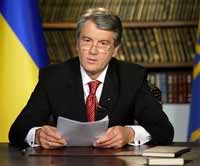Yushchenko dissolves parliament to spite Tymoshenko
Ukrainian President Viktor Yushchenko dissolved the country’s parliament, the Supreme Rada, and set the date for the early parliamentary elections on December 7, 2008. The president said that he did not see any other way to protect the language, the national security, the political course and the European perspective of the nation.

As it happened before, Yushchenko accused his political rival, Yulia Tymoshenko, for destroying democracy in the country for the sake of her human ambition and lust for power. Yushchenko also stated that Tymoshenka had failed the economic and social policies of Ukraine.
The Ukrainian president dashed hopes for the revival of a pro-Western coalition and throwing this politically volatile ex-Soviet nation into further turmoil.
The decision was likely to deepen political turbulence in the former Soviet republic, with estranged ally Yulia Tymoshenko's camp and some members of Yushchenko's own party vowing to challenge the move.
The dissolution of parliament Wednesday marked a tactical victory for Yushchenko in a fierce power struggle with Tymoshenko, his partner in the 2004 Orange Revolution who has fought to keep her job as prime minister.
The vote will be the third parliamentary election in as many years and dealt a severe blow Wednesday to an economy already battered by the global financial crisis. The date of the election was not announced.
The decision culminates a fierce battle between Yushchenko and Prime Minister Yulia Tymoshenko, his estranged former partner in the Orange Revolution that shook this former Soviet republic loose from the grip of Russian influence and launched often chaotic democracy for its 46 million people. Both are seen as likely rivals in the 2010 presidential vote.
Opinion polls show that Yushchenko's party is likely to lose parliament seats in the new vote. Tymoshenko, who has fought to revive their coalition and retain power, says the president's only motivation for dissolving the Verkhovna Rada is removing her from her job.
Speaking in a televised address to the nation aired late Wednesday, Yushchenko accused Tymoshenko of ignoring national interests for the sake of acquiring power.
"I am deeply convinced that the democratic coalition was ruined by one thing - the ambition of one person, the hunger for power ... and the dominance of personal interests over national ones," Yushchenko said.
The address had apparently been recorded in advance, as Yushchenko was in Italy on an official visit.
The announcement was likely to spark protests from Tymoshenko. She has said calling an election before late November - when the legislature would have worked a full year - would be unconstitutional and has vowed to challenge such a decision. Her party members have threatened mass protests.
Tymoshenko has also suggested holding early presidential elections alongside parliamentary ones, hinting that she would run.
Yushchenko defended his move as the only way to preserve the country's democracy and national interests.
"They wanted to turn us back and then, as now, I am defending our future," Yushchenko said. "The vote will be democratic and lawful."
Yushchenko pulled out of the nine-month-old coalition with Tymoshenko last month, after she sided with the opposition to adopt a series of law that trim his powers. Yushchenko has also accused Tymoshenko of selling out to Russia.
Yushchenko has harshly criticized Russia for its August war in Georgia and assailed Tymoshenko for her reluctance to condemn Moscow's action. Tymoshenko says she opposed the war, but calls for balanced ties with Russia.
Subscribe to Pravda.Ru Telegram channel, Facebook, RSS!




